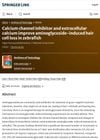14 citations,
June 2021 in “Journal of dermatological science” Argan press cake extract might help grow hair and protect hair cells from damage and inflammation.
[object Object] 13 citations,
April 2010 in “Journal of dermatological science” Chemotherapy-induced hair loss is partly due to decreased laminin-511 and increased laminin-332.
 9 citations,
March 2022 in “Antioxidants”
9 citations,
March 2022 in “Antioxidants” Synthetic antioxidants are effective, cheap, and stable, with some like zinc and cholecalciferol reducing child and cancer deaths, but the safety of additives like BHA, BHT, TBHQ, and PEG needs more research.
 7 citations,
July 2022 in “Pharmaceuticals”
7 citations,
July 2022 in “Pharmaceuticals” Pumpkin Seed Oil in niosomes may help treat hair loss and improve hair growth.
 5 citations,
September 2022 in “Antioxidants”
5 citations,
September 2022 in “Antioxidants” A substance from Caulerpa racemosa seaweed may protect against skin damage caused by air pollution by reducing oxidative stress and cell death.
5 citations,
January 2012 in “International journal of trichology” Chemotherapy-induced hair loss is a major concern, but various treatments show promise in preventing and reversing it.
5 citations,
February 1992 in “Journal of chromatography A/Journal of chromatography” The document concludes that a fast, accurate method to measure vitamin E derivative in cosmetics was developed.
 2 citations,
July 2023 in “Journal of Cosmetic Dermatology”
2 citations,
July 2023 in “Journal of Cosmetic Dermatology” The topical treatment reduced hair loss and improved hair growth in patients with certain types of hair loss.
2 citations,
April 2023 in “PubMed” Improving maternal diets can prevent severe health issues, including death, from goiter in goat kids.
2 citations,
March 2020 in “JAAD case reports” A leukemia patient showed skin peeling similar to kwashiorkor, a severe protein deficiency.
2 citations,
January 2016 in “Springer briefs in molecular science” Using natural sources as hair conditioners can help restore shine and softness to damaged hair.
1 citations,
March 2009 in “China Journal of Chinese Matera Medica” Procyanidins may have antioxidant, heart health, cancer-fighting, anti-inflammatory, anti-diabetic, liver-protective, and other health benefits with high efficiency and low toxicity.
1 citations,
April 2022 in “Acta histochemica” Pumpkin seed oil promotes hair growth and improves hair texture without harmful effects.
 April 2024 in “Archives of toxicology”
April 2024 in “Archives of toxicology” Certain substances can protect against ear damage from some antibiotics in zebrafish.
 January 2023 in “Side effects of drugs annual”
January 2023 in “Side effects of drugs annual” Some vitamins, amino acids, and alternative medicines can cause serious side effects, including bone, muscle, and skin issues, and healthcare professionals should be aware of these risks.
 October 2022 in “Journal of the American Academy of Dermatology”
October 2022 in “Journal of the American Academy of Dermatology” "Clean" shampoos use fewer allergenic preservatives than traditional ones but still contain fragrances, and their actual risk of causing skin reactions is unclear.
258 citations,
July 2005 in “Journal of lipid research” DGAT1 enzyme helps make diacylglycerols, waxes, and retinyl esters.
255 citations,
September 2016 in “Frontiers in plant science” Reactive oxygen species (ROS) help control plant growth and development.
227 citations,
April 2020 in “Cell” More precise, personalized therapies are needed for autoimmune diseases.
182 citations,
November 2018 in “Cosmetics” Seaweeds have beneficial compounds for skin care, including anti-aging and protective effects.
[object Object]  96 citations,
September 2021 in “International Journal of Molecular Sciences”
96 citations,
September 2021 in “International Journal of Molecular Sciences” Chitosan, a natural substance, can be used to create tiny particles that effectively deliver various types of drugs, but more work is needed to improve stability and control of drug release.
83 citations,
August 2020 in “Resources” Macroalgae compounds offer sustainable, effective benefits for cosmetics.
 80 citations,
April 2006 in “Clinical Interventions in Aging”
80 citations,
April 2006 in “Clinical Interventions in Aging” Minoxidil and Finasteride are effective for male baldness; more research is needed for hair aging treatments.
76 citations,
April 2002 in “Urology” Selenium and vitamin E supplements have mixed effects on prostate cancer risk and may not be beneficial for everyone.
60 citations,
October 2020 in “Journal of Controlled Release” Curcumin nanocrystals in simple gels effectively penetrate hair follicles, but humectants can reduce this efficacy.
 57 citations,
October 2021 in “Journal of ethnopharmacology”
57 citations,
October 2021 in “Journal of ethnopharmacology” Indian herbal medicine shows promise for treating skin diseases but needs more research to prove effectiveness.
54 citations,
June 2020 in “Pharmaceutics” New nanocarriers improve drug delivery for disease treatment.
53 citations,
July 2016 in “Cosmetics” Future hair cosmetics will be safer and more effective.
34 citations,
January 2022 in “Molecules/Molecules online/Molecules annual” Natural ingredients in cosmeceuticals are beneficial for skin and hair health with few side effects.
 33 citations,
July 2021 in “Clinical, Cosmetic and Investigational Dermatology”
33 citations,
July 2021 in “Clinical, Cosmetic and Investigational Dermatology” Nanocarrier technology in cosmetics improves ingredient delivery and effectiveness while reducing side effects.










